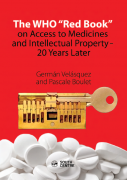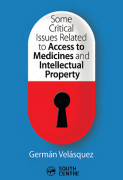SC Side Event to the 24th WIPO SCP, 29 June 2016
Title: Patents and Public Health: Exploring Options for Future Work in the WIPO
Date: 29 June 2016, 13:00-14:45
Venue: WIPO, Room B
Organizer: South Centre (more…)
Title: Patents and Public Health: Exploring Options for Future Work in the WIPO
Date: 29 June 2016, 13:00-14:45
Venue: WIPO, Room B
Organizer: South Centre (more…)
 About the book: The publication in 1998 by the WHO’s Essential Drugs Department of the document “Globalization and Access to Drugs: Implications of the WTO/TRIPS Agreement” marked a point in time in the movement to ensure access to essential medicines for all. The publication, often referred to as ‘the WHO red book’, marked the beginning of an international policy process to address the issue of innovation and access to essential medicines. It triggered a series of reactions from the pharmaceutical industry, the US Government and the WTO, reproaching WHO for stepping out of its role. In light of these attacks, the then Director General of WHO decided to send the document to be revised by three independent academics specializing in intellectual property. The letters and documents criticizing the WHO publication as well as the review by the three international experts are reproduced in this book.
About the book: The publication in 1998 by the WHO’s Essential Drugs Department of the document “Globalization and Access to Drugs: Implications of the WTO/TRIPS Agreement” marked a point in time in the movement to ensure access to essential medicines for all. The publication, often referred to as ‘the WHO red book’, marked the beginning of an international policy process to address the issue of innovation and access to essential medicines. It triggered a series of reactions from the pharmaceutical industry, the US Government and the WTO, reproaching WHO for stepping out of its role. In light of these attacks, the then Director General of WHO decided to send the document to be revised by three independent academics specializing in intellectual property. The letters and documents criticizing the WHO publication as well as the review by the three international experts are reproduced in this book.
Authors: Germán Velásquez and Pascale Boulet
 About the book: The international debate and negotiations over access to medicines in the last ten years have been one of the most important moments in the recent history of public health. This debate is taking place in UN specialized agencies like WHO, UNDP, UNCTAD, UNAIDS, WIPO, WTO, the Commission of Human Rights, NGOs working on health, philanthropic foundations, and the pharmaceutical industry. This book is a collection of papers by the South Centre between 2011 and 2014 on the deliberations and negotiations in the World Health Organization (WHO) on access to medicines and their relationship with other actors dealing with international trade and intellectual property regimes.
About the book: The international debate and negotiations over access to medicines in the last ten years have been one of the most important moments in the recent history of public health. This debate is taking place in UN specialized agencies like WHO, UNDP, UNCTAD, UNAIDS, WIPO, WTO, the Commission of Human Rights, NGOs working on health, philanthropic foundations, and the pharmaceutical industry. This book is a collection of papers by the South Centre between 2011 and 2014 on the deliberations and negotiations in the World Health Organization (WHO) on access to medicines and their relationship with other actors dealing with international trade and intellectual property regimes.
Author: Germán Velásquez is the Special Adviser for Health and Development at the South Centre, Geneva, Switzerland
The grant of patents and the exorbitant cost of “lifesaving” drugs
By Germán Velásquez
The important relationship between the examination of patents carried out by national patent offices and the right of citizens to access to medicines hasn’t always been well understood. Too often these are viewed as unrelated functions or responsibilities of the state. And the reason is clear: patentability requirements are not defined by patent offices, but frequently by the courts, tribunals, legislation or treaty negotiators. This is the case when patent policy is implemented in isolation from, rather than guided by, public health policy. (more…)
South Centre Calls on the WTO TRIPS Council to Support Access to Medicines and Technological Advancement for the Least Developed Countries
The South Centre fully supports the Least Developed Countries’ (LDC) request for an extension of the transition period granted to LDCs under Article 66.1 of the World Trade Organization’s Agreement on Trade Related Aspects of Intellectual Property Rights (TRIPS) in respect of pharmaceutical products for as long as a WTO member remains an LDC, and the waiver from obligations under Articles 70.8 and 70.9 of the TRIPS Agreement. (more…)
Intellectual Property in the Trans-Pacific Partnership: Increasing the Barriers for the Access to Affordable Medicines
Most free trade agreements signed by the United States, the European Union and the members of the European Free Trade Association (EFTA) in the last 15 years contain chapters on intellectual property rights with provisions applicable to pharmaceuticals. Such provisions considerably expand the rights recognized to pharmaceutical companies under the Agreement on Trade Related Aspects of Intellectual Property Rights (TRIPS) established in the context of the World Trade Organization. (more…)
Guidelines on Patentability and Access to Medicines
Until recently, the link between the examination of patents carried out by national patent offices and the right of citizens to access to medicines was not at all clear. They were two functions or responsibilities of the State that apparently had nothing to do with each other. Examining the growing literature on intellectual property and access to medicines, it seems that the analysis of one actor has been left out: the patent offices. (more…)
Speaking notes by Martin Khor, Executive Director of the South Centre, for the Social Forum of the United Nations Human Rights Council, 18 February 2015
The following is a statement presented by Martin Khor, Executive Director of the South Centre, during the 2015 Social Forum of the United Nations Human Rights Council which took place from 18 to 20 February 2015 in Palais des Nations, Geneva, Switzerland. (more…)
Transition Period for Providing Patent Protection for Pharmaceutical Products by LDCs: The Need for Extension
How can Least Developed Countries (LDCs) make effective use of the transition period for the purposes stated in Article 66.1 of the Agreement on Trade Related Aspects of Intellectual Property Rights (TRIPS), and in particular to promote access to affordable medicines and promote local manufacturing of generic medicines? Should LDCs seek a further extension of the transition period for pharmaceutical products beyond 1 January 2016?
The African Regional Intellectual Property Organization (ARIPO) Protocol on Patents: Implications for Access to Medicines
This paper was commissioned to better understand the workings of the African Regional Intellectual Property Organization (commonly known as “ARIPO”) with regard to its Protocol on Patents and Industrial Designs and to examine the effect of implementation of the Protocol (Section on Patents) on the promotion of access to affordable medicines. (more…)
South Centre Views on US Review of Indian IPR Policy
Below is the official submission of the South Centre sent to the US Trade Representative regarding the Super 301 out of cycle review that the USTR is undertaking with regard to the IPR policy and practice of India. In this submission the South Centre has expressed concern about the pressures that the US is exerting on India to change its IPR policy and laws. (more…)
Regional Pooled Procurement of Medicines in the East African Community
This paper explores the current discussions in the East African Community (EAC) with regard to the establishment of a regional pooled procurement mechanism for essential medicines. (more…)